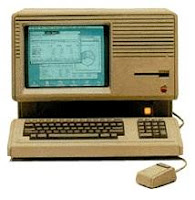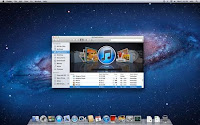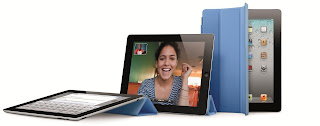On the 1st of April 1976 Steve
Wozniak, Steve Jobs and Ron Wayne founded Apple Computer Company, Inc., which would
later become Apple Inc. The company was started due to Wozniak’s idea to
upgrade the video terminal he built earlier into a complete computer. As a consequence
in May 1976 Apple I was out in the market followed by Apple II eleven months
later and Apple III in 1980.[1], [2], [3]
 Lisa
– 1983
Lisa
– 1983 The Company was developing, and attracted the attention of Xerox, who invested $1 million into Apple, and for a limited period of time gave them access to PARC (Palo Alto Research Center). In 1983 Apple released a computer with a Graphic User Interface (GUI) called Apple Lisa, based on the GUI research carried in PARC.[4]
Macintosh
128k – 1984
In 1984 the company released Macintosh 128k
which was considered the first affordable computer. It had a black and white
monitor and floppy disk drive with a 8 MHz Motorola 68000 processor.[5]
Macintosh
Portable – 1989
The Mac Portable, released in 1989, was an attempt
to reduce the size of Apple’s computers and produce a more mobile device.
However the active matrix screen, made later as a backlit, increased the cost
of the already expensive machine.[6]
iMac
– 1998
The iMac was designed in 1998 with the
Internet in mind, hence the ‘i’ in iMac. It was enclosed in a stylish case and
was meant to target the lower end customers. Equipped with an internal 56Kpbs
modem and USB mouse and keyboard, this machine was considered the computer of
the millennium.[7], [8]
iBook
– 1999
The iBook - PowerPC consumer laptop was
perhaps the most highly anticipated Apple computer ever. Aiming at the same
market as the iMac it provides unique design combined with a stylish handle
making it easy to carry. The most exclusive feature of the iBook is the
AirPort- wireless networking system. In 2006 the iBook was replaced by the
MacBook.[9]
Mac
OS X – 2001
 According to the Apple press Info: “Mac OS X is the world’s most advanced
operating system, combining the power and openness of UNIX with the legendary
ease of use and broad applications base of Macintosh.”
According to the Apple press Info: “Mac OS X is the world’s most advanced
operating system, combining the power and openness of UNIX with the legendary
ease of use and broad applications base of Macintosh.” The Mac OS X operating system became the main commercial alternative to Windows OS. The subsequent versions are named after “big cats” with the latest one to be “Lion”.[10]
iPod
– October 2001
With the release of the iPod in 2001 Apple
entered the world music market allowing their customers to keep most, if not all,
of their music collection in their pocket. Steve Jobs announced: “With iPod,
listening to music will never be the same again” and certainly it is not.[11]
In 2003 Apple launched the iTunes store where
music from a large variety of artists can be bought and downloaded in an
instant, giving limited right of distribution on a number of Apple products. This
allows customers access to their favorite songs on a number of devices, without
violating the copyright holders (i.e. producers, artists, composers, etc.)
rights.
There are two very important things about
this machine: the year it was built 2006 and its specification, for such a high
spec machine to be available at this time was fantastic. Even now 5 years on
this is a fairly high spec machine. Below is a brief description of what is in
the box of this super powerful computer:
·
64-bit desktop workstation
·
1GB of 667 MHz DDR2 (expandable
up to 16GB!);
·
NVIDIA GeForce 7300GT with
256MB GDDR2 SDRAM
·
or ATI Radeon X1900XT with
512MB of GDDR3 SDRAM
·
or NVIDIA Quadro FX4500 with
512MB of GDDR3 SDRAM
·
250GB SATA 7200rpm expandable
up to four 500GB (or 2TB in total!)[13]
iPhone
& iOS – January 9, 2007
The world of mobile phones was revolutionized
with the development of the iPhone. The device integrates a mobile phone, a
widescreen iPod, a device to browse the Internet, send emails, search the web
and use maps. The iPhone introduced a new way of interaction using your
fingers. All this is possible through the carefully designed mobile operating system
iOS.[14]
With 0.16-inches at its thinnest point and a maximum
height of 0.76-inches the MacBook Air is considered as “The World’s Thinnest
Notebook”. The small size however does not compromise the functionality,
usability or the power of the device. It has a full size keyboard, large track
pad supporting multi-touch gestures, a 1.6 GHz or 1.8 GHz Intel Core 2 Duo
processor, 2GB memory, 80GB 1.8-inch hard drive and an optional 64GB solid state
hard disk.[15]
iPad
– January 27, 2010
 The iPad is not simply just a larger version
of the iPhone, as some thought when it was first announced, it is an answer to
the demand for a more mobile, powerful and easy to use device. It has an
increased functionality and can be used for a number of applications such as; browsing,
reading, emails, watching videos, listening to music and much more with
specially designed Apps.
The iPad is not simply just a larger version
of the iPhone, as some thought when it was first announced, it is an answer to
the demand for a more mobile, powerful and easy to use device. It has an
increased functionality and can be used for a number of applications such as; browsing,
reading, emails, watching videos, listening to music and much more with
specially designed Apps.
Perhaps the best description of the iPad is
the one made by Steve Jobs:
“iPad is our most advanced technology in a magical and
revolutionary device at an unbelievable price, iPad creates and defines an
entirely new category of devices that will connect users with their apps and
content in a much more intimate, intuitive and fun way than ever before.”[16]
This article does not aim to give a full
product history of the Apple Inc company. In fact innovations such as the App
Store, MacMini, iCloud and many of the devices and achievements in-between the
products mentioned above have been deliberately omitted. The main aim is to try
to show how Apple and in particular Steve Jobs, who recently passed away, have
revolutionized our world in terms of how we communicate and share information, how
we live, how we are and perhaps even the way we think. If those devices had
never been created our history would be very different.
References:
[1] http://applemuseum.bott.org/sections/history.html
[2] http://en.wikipedia.org/wiki/History_of_Apple_Inc.
[3] http://www.npr.org/templates/story/story.php?storyId=6167297
[4] http://applemuseum.bott.org/sections/gui.html
[5] http://www.apple-history.com/?page=gallery&model=128k&sort=date&performa=off&order=ASC
[6] http://www.apple-history.com/?page=gallery&model=portable&sort=date&performa=off&order=ASC
[7] http://www.apple-history.com/?page=gallery&model=imac&sort=date&performa=off&order=ASC
[8] http://en.wikipedia.org/wiki/IMac#cite_note-2
[9] http://www.apple-history.com/?page=gallery&model=ibook&sort=date&performa=off&order=ASC
[10] http://www.apple.com/pr/library/2001/01/09Apples-Mac-OS-X-to-Ship-on-March-24.html
[11] http://www.apple.com/pr/library/2001/10/23Apple-Presents-iPod.html
[12] http://www.apple.com/pr/library/2003/04/28Apple-Launches-the-iTunes-Music-Store.html
[13] http://www.apple.com/pr/library/2006/08/07Apple-Unveils-New-Mac-Pro-Featuring-Quad-64-bit-Xeon-Processors.html
[14] http://www.apple.com/pr/library/2007/01/09Apple-Reinvents-the-Phone-with-iPhone.html
[15] http://www.apple.com/pr/library/2008/01/15Apple-Introduces-MacBook-Air-The-Worlds-Thinnest-Notebook.html
[16] http://www.apple.com/pr/library/2010/01/27Apple-Launches-iPad.html
[2] http://en.wikipedia.org/wiki/History_of_Apple_Inc.
[3] http://www.npr.org/templates/story/story.php?storyId=6167297
[4] http://applemuseum.bott.org/sections/gui.html
[5] http://www.apple-history.com/?page=gallery&model=128k&sort=date&performa=off&order=ASC
[6] http://www.apple-history.com/?page=gallery&model=portable&sort=date&performa=off&order=ASC
[7] http://www.apple-history.com/?page=gallery&model=imac&sort=date&performa=off&order=ASC
[8] http://en.wikipedia.org/wiki/IMac#cite_note-2
[9] http://www.apple-history.com/?page=gallery&model=ibook&sort=date&performa=off&order=ASC
[10] http://www.apple.com/pr/library/2001/01/09Apples-Mac-OS-X-to-Ship-on-March-24.html
[11] http://www.apple.com/pr/library/2001/10/23Apple-Presents-iPod.html
[12] http://www.apple.com/pr/library/2003/04/28Apple-Launches-the-iTunes-Music-Store.html
[13] http://www.apple.com/pr/library/2006/08/07Apple-Unveils-New-Mac-Pro-Featuring-Quad-64-bit-Xeon-Processors.html
[14] http://www.apple.com/pr/library/2007/01/09Apple-Reinvents-the-Phone-with-iPhone.html
[15] http://www.apple.com/pr/library/2008/01/15Apple-Introduces-MacBook-Air-The-Worlds-Thinnest-Notebook.html
[16] http://www.apple.com/pr/library/2010/01/27Apple-Launches-iPad.html
Images
in the header from left to right:
Apple I: http://www.apple-history.com/images/models/I.gif
S. Jobs: http://www.v3.co.uk/IMG/333/197333/steve-jobs-apple-colour-370x229.jpg?1317900966
iPad 2: http://images.apple.com/ipad/home/images/hero2_20111004.png
S. Jobs: http://www.v3.co.uk/IMG/333/197333/steve-jobs-apple-colour-370x229.jpg?1317900966
iPad 2: http://images.apple.com/ipad/home/images/hero2_20111004.png
Other
images:
Lisa: http://www.apple-history.com/images/models/lisa.gif
Macintosh 128k: http://www.apple-history.com/images/models/128k.jpg
Macintosh Portable: http://www.apple-history.com/images/models/portable.gif
iMac: http://upload.wikimedia.org/wikipedia/commons/thumb/c/c0/IMac_Bondi_Blue.jpg/220px-IMac_Bondi_Blue.jpg
iBook: http://www.apple-history.com/images/models/ibook_blue_hand.jpg
Mac OS X: http://upload.wikimedia.org/wikipedia/en/8/80/Mac_OSX_Lion_screen.png
iPod: http://store.storeimages.cdn-apple.com/2090/store.apple.com/Catalog/regional/amr/classic/img/product-white-classic.jpg
iTunes: http://advertboy.files.wordpress.com/2007/07/itunes500.jpg
Mac Pro: http://www.apple.com/pr/library/2006/08/07Apple-Unveils-New-Mac-Pro-Featuring-Quad-64-bit-Xeon-Processors.html
iPhone: http://www.computertipsplus.com/wp-content/uploads/2011/06/iphone-1.jpg
Macintosh 128k: http://www.apple-history.com/images/models/128k.jpg
Macintosh Portable: http://www.apple-history.com/images/models/portable.gif
iMac: http://upload.wikimedia.org/wikipedia/commons/thumb/c/c0/IMac_Bondi_Blue.jpg/220px-IMac_Bondi_Blue.jpg
iBook: http://www.apple-history.com/images/models/ibook_blue_hand.jpg
Mac OS X: http://upload.wikimedia.org/wikipedia/en/8/80/Mac_OSX_Lion_screen.png
iPod: http://store.storeimages.cdn-apple.com/2090/store.apple.com/Catalog/regional/amr/classic/img/product-white-classic.jpg
iTunes: http://advertboy.files.wordpress.com/2007/07/itunes500.jpg
Mac Pro: http://www.apple.com/pr/library/2006/08/07Apple-Unveils-New-Mac-Pro-Featuring-Quad-64-bit-Xeon-Processors.html
iPhone: http://www.computertipsplus.com/wp-content/uploads/2011/06/iphone-1.jpg











No comments:
Post a Comment